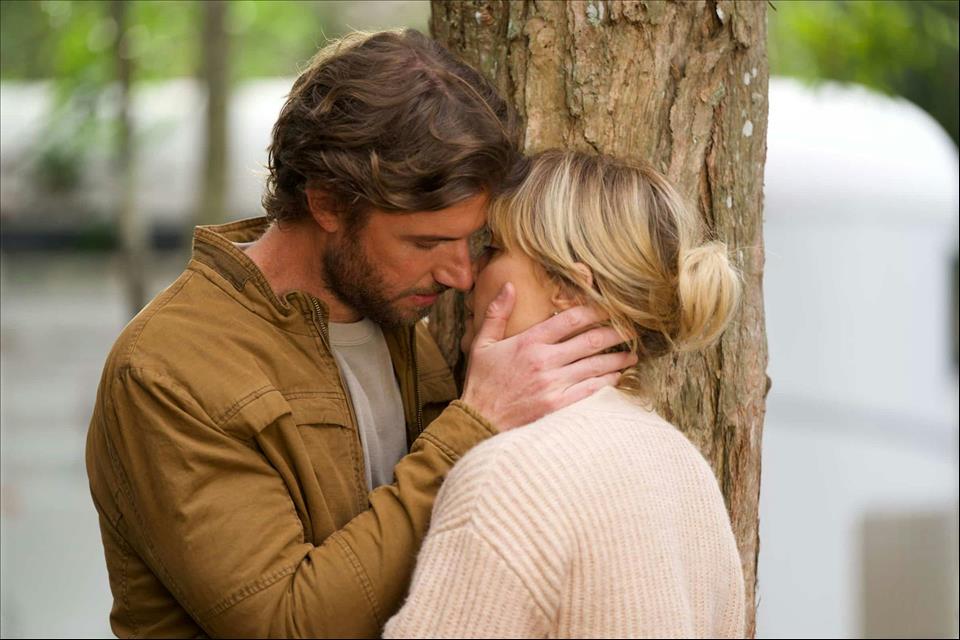
Aussie Film Take My Hand Is A Sweet Love Story But It Misses The Mark In Depicting Chronic Illness
When she is diagnosed with multiple sclerosis (MS) and, in quick succession, her husband suddenly dies, she upends her children to return to her hometown in rural New South Wales.
There, after 20 years abroad, Laura rekindles a past romance with Michael (Adam Demos), who is undeterred by her MS.
Directed by John Raftopoulos, the 2024 Australian film Take My Hand, now streaming on various platforms , is inspired by the lives of Raftopoulos and his wife Claire Jensz, who lives with MS.
I too have MS. Ultimately, I found Take My Hand misses the mark in representing the complexity of living with MS. But its depictions of care are worth talking about.
A variable diagnosisTake My Hand portrays Laura's MS as steadily progressing. This diverges from the experience of Jensz , who describes a period of“feeling better” after having children.
Like 85% of people diagnosed , my MS is“relapsing-remitting”. This form of MS is marked by fluctuating symptoms that vary from day to day, often drastically during flares.
In not looking directly at this diagnosis, the film bypasses an opportunity to depict a frequently misunderstood aspect of living with episodic disability: waking up unsure of what your body can or cannot do.
By focusing solely on steady progression, the film sidesteps the unpredictability, confusion, frustration and resilience required to navigate a body that feels different from one moment to the next.
Hit-and-miss messages of 'hope'Take My Hand struggles to balance its romantic narrative with its ambition to raise awareness about MS . Laura and Michael's chemistry is earnest, but often clumsy.
The film makes a commendable attempt to profile male carers. Care work is often invisible and assumed to be a“natural” quality of women, who account for 72% of primary carers in Australia.
While a minority, male carers face specific barriers , including isolation and stigma from rigid gender roles positioning care as“feminine”.
At times, Michael depicts a form of masculine strength grounded in care. In one striking scene, Laura doesn't make it to the bathroom in time at a café. As Michael helps her clean up, reassurance is mutually conveyed. Powerfully, this makes visible the usually hidden dynamic of care and its shared emotional toll.
In another scene, Michael is undressing Laura. Laura asks,“What if I end up in a wheelchair?” Michael replies,“Well, as long as we can still do this, it'll be okay”.
The vulnerability of this moment is undermined by the implication that Laura's value – and Michael's care – depends on her attractiveness and sexual availability. Moments like these equate“hope” for people with MS to finding a partner willing to“overlook” potential physical decline.
Relational dynamics left under-exploredThe film sidesteps exploration of Laura's own role as a carer.
In one scene, Laura mentions caring for her parents, particularly her mother, who has advanced MS .
Michael's dismissal, insisting she needs to be taken care of herself, overlooks the reality that a significant proportion of primary carers – particularly women – identify as disabled .
By failing to explore this intersection, the script reinforces stereotypes that equate disability with“dependence”.
In a fleeting moment, Laura's sister Rachel (Natalie Bassingthwaighte) glances at Laura's walking stick. Bassingthwaighte conveys the pain of witnessing the deteriorating health of someone you love.
Laura's experience of being witnessed hints toward the emotional labour people with degenerative conditions manage. MS Australia/tompaulbyrnes
Likewise, Laura's experience of being witnessed throughout the film hints toward the emotional labour people with degenerative conditions manage: fielding our loved ones' oscillations between pity, hope and grief for us, in among our own.
This involves reassuring others (as much as ourselves) that we are“okay” – despite unpredictable bodies and uncertain disease trajectories.
Unfortunately, these layered experiences and relationships are largely unexplored in favour of the central romance.
A flawed but earnest attemptFor viewers familiar with the nuanced realities of living with chronic illness, the film may feel like a missed opportunity to delve deeper into the complexities of love, care and interdependence.
But it could support conversations about forms of masculinity and its expression through care and respect.
I recognise the importance of profiling positive examples of male carers. My mum has advanced stage MS, and my dad is her primary carer. Following the Disability Royal Commission , and in an era where calling out abuse and toxic masculinity is more critical than ever , so is the need to depict positive male role models. People like my dad.
Take My Hand is a sweet, if flawed, story of returning to a place you once outgrew. MS Australia/tompaulbyrnes
The film doesn't get this entirely right, but its attempt is worth acknowledging.
Ultimately, Take My Hand is a sweet, if flawed, story of returning to a place you once outgrew and reconnecting with an old love. But it is not a meaningful window into the realities of living, loving and being loved with MS.
Its tendency to oversimplify and sentimentalise the experience of chronic illness diminishes its potential impact. While the film's heart is in the right place, it leaves audiences wanting a richer, more authentic exploration of its themes.

Legal Disclaimer:
MENAFN provides the
information “as is” without warranty of any kind. We do not accept
any responsibility or liability for the accuracy, content, images,
videos, licenses, completeness, legality, or reliability of the information
contained in this article. If you have any complaints or copyright
issues related to this article, kindly contact the provider above.
















Comments
No comment